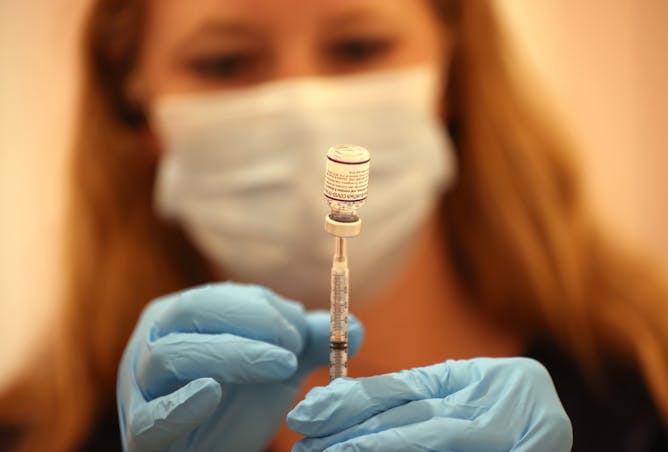|
If you’ve been unsure whether you should or could get a booster shot – depending on your age, health or workplace status and the brand of COVID-19 vaccine you originally received – you’re not alone. The science and federal recommendations surrounding booster shots have been challenging to parse and keep up with over the past couple of months, to say the least.
But now that the Centers for Disease Control and Prevention has signed off on booster shots for certain Americans for all three of the COVID-19 vaccines available in the U.S. and has given the green light to a mix-and-match vaccine approach, it will become easier and less confusing for eligible Americans to get their booster shots.
Many people, though, still have questions about the need for boosters and wonder: How does the immune response to vaccines shift over time, and what happens when the immune system receives an added “boost” of protection against COVID-19?
Glenn Rapsinski, an infectious disease expert at University of Pittsburgh Health Sciences, helps bring clarity to these questions. Rapsinski explains the difference between the body’s initial immune response to a vaccine, which activates and mobilizes the immune system against a perceived threat, and the secondary responses that occur when the body receives a booster shot. He also discusses some of the latest research on the mix-and-match vaccine approach.
Also today:
|

|
Amanda Mascarelli
Senior Health and Medicine Editor
|
|

Discuss with your doctor whether or not you need a booster – and if so, which vaccine will work best for you.
Justin Sullivan/Getty Images News via Getty Images
Glenn J. Rapsinski, University of Pittsburgh Health Sciences
As boosters are authorized for all three COVID-19 shots available in the US, the ability to swap out vaccine types looks to be a boon to the immune system.
|
Environment + Energy
|
-
Tom Corringham, University of California San Diego
Earth’s biggest rivers are streams of warm water vapor in the atmosphere that can cause huge rain and snowfall over land. Climate change is making them longer, wetter and stronger.
|
|
Politics + Society
|
-
Mirya Holman, Tulane University; Angela L. Bos, The College of Wooster; J Celeste Lay, Tulane University; Jill S. Greenlee, Brandeis University; Zoe M. Oxley, Union College
As young children learn about politics and political figures, they internalize the idea that politics is a man’s world, which ultimately means political representation is heavily skewed toward men.
|
|
Arts + Culture
|
-
Brad Bushman, The Ohio State University; Dan Romer, University of Pennsylvania
A tragic accident resulted in the shooting death of a cinematographer on the set of actor Alec Baldwin’s latest movie. The dangers of more guns on set extend to society, two scholars argue.
|
|
Education
|
-
Nadirah Farah Foley, New York University
Elite universities have been giving special preference to children of prior graduates for more than a century. Has the time come for that practice to stop? A sociologist weighs in.
-
Frank Fernandez, University of Florida; Matthew J Capaldi, University of Florida
Taking just one political science class makes college students more likely to show up at the polls, two researchers find.
|
|
Health + Medicine
|
-
Gregory Fabiano, Florida International University
Even when the condition lasts a lifetime, there are behavioral treatments and prescription drugs that make it easier for people with attention-deficit hyperactivity disorder to thrive.
|
|
Ethics + Religion
|
-
Abdulkader Sinno, Indiana University
A scholar of Afghan affairs explains the religious affiliations of different ethnic groups in Afghanistan and why they may not share a common understanding of Islam.
|
|
Science + Technology
|
-
Jacqulyne Robichaux, The University of Texas MD Anderson Cancer Center
Every cancer is different. Grouping cancer mutations by their structure and function could help make treatments more personalized.
|
|
Trending on site
|
-
Pascale Joassart-Marcelli, San Diego State University
Ethnic food is cheap, and it appeals to adventurous eaters. Real estate agents and investors have caught on.
-
Carlo Ratti, Massachusetts Institute of Technology (MIT)
As you’re walking through city streets on your way to work, school or appointments, you probably feel like you’re taking the most efficient route. Thanks to evolution, you’re probably not.
-
Shannon Bow O'Brien, The University of Texas at Austin College of Liberal Arts
Donald Trump’s lawsuit to stop the release to Congress of potentially embarrassing or incriminating documents puts the National Archives in the middle of an old legal conflict.
|
|
Reader Comments 💬
|
-
“I have this feeling that the higher ed will be split into two tiers; the more affluent students will be able to afford to go to face-to-face classes while everyone else will be “stuck” in the online environment. And in the end, the students that would gain the most from the F2F interactions will not be able to get access to it…”
– Reader Veronika Dolar on the story Future of college will involve fewer professors
|
|
| |
| |
| |
| |
| |
| |
|
|